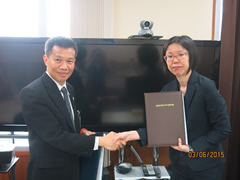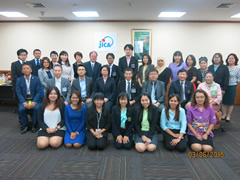Project News
2015-06-03
Joint Midterm Review Report
From 20th May to 3rd June 2015, LTOP Project had the Joint Midterm Review Report.
The purposes of the Midterm Review are as follows:
1) to confirm the performance and implementation process of the Project through reviewing project documents and interviews with the various stakeholders
2) to jointly review the project by five evaluation criteria at this moments and make a joint midterm review report
3) to make recommendations and draw lessons from the results of the review for the remaining project period
The member of the Japanese team is Human Development Department, JICA, Consultant, and the experts. The Review Team researched and had interviews with the counterparts to each players for care service for the frail elderly in the 6 project sites. And the Japanese and Thai review team shared and had discussions for the remaining project period.
The results of the review are follows.
- Achievement of the Outputs and the Project Purpose
The review team concluded that the Project has been implemented as planned mostly toward the achievement of the Project Purpose. It is expected that the Project Purpose will be achieved if collective actions will be taken by relevant ministries and stakeholders by following recommendations in the latter half of the Project period - Review by the Five Evaluation Criteria
Relevance: "high", Effectiveness: "high", Efficiency: "general", Impact: "several positive impacts have been observed", Sustainability: "expected to a certain extent" - Recommendations
1) It is required for the stakeholders at the central level to redefine the role and responsibility of "care worker" and "care manager" in the LTOP in order to provide suitable and sustainable service for the care needs in the community. The definition of each player has to be derived from the discussion on the entire image of community care system and the role of each player in the community including the elderly in need, family, community members, and specialists such as nurses and social workers.
2) Considering the growing numbers of elderly people, it is expected that the role of family and social condition will change. Accordingly, it is necessary to grasp the care needs in quantity and quality in order to plan the sustainable care system in the future. In order to prepare for the first half of the 2030s, when the growth of the population age 75 and over will peak in Thailand, it is necessary to discuss at national level about the appropriate care system including securing the numbers of service providers based on the estimate of numbers of the elderly who need the long-term care and necessary service providers.
In order to make sure those mentioned above, relevant authorities at central level need to discuss the desirable care services being fitted into the local setting as well as the measure for improvement of the current "Model Services" in terms of sustainability with concerned authorities at each sites under LTOP.
3) In the second survey on effectiveness of "Model Services" (to be implemented in June. July, 2015), it is recommended to collect information on actual situation of service delivery, such as input of resources, satisfactory rate of the elderly, satisfactory rate and burden of care of the family caregivers. The results of the survey need to be analyzed according to each project site. The results are expected to be utilized for the improvement of "Model Service" in the latter half of the Project period, and to be reflected to policy recommendations.
4) For drafting of the policy recommendations on the long-term care for the elderly, it is necessary for the stakeholders at central level to understand on-going activities and policy direction by Thai government including MOPH and MSDHS such as human resource development of care service providers and the care systems at local level. At the same time, sharing information about the activities of the LTOP with the related authorities is important so as to fully utilize the Japan's experience/lessons learned in policy recommendations.


- About JICA
- News & Features
- Countries & Regions
- Our Work
- Thematic Issues
- Types of Assistance
- Partnerships with Other Development Partners
- Climate Change / Environmental and Social Considerations
- Evaluations
- Compliance and Anti-corruption
- Science and Technology Cooperation on Global Issues
- Research
- JICA Development Studies Program / JICA Chair
- Support for the Acceptance of Foreign HRs / Multicultural and Inclusive Community
- Publications
- Investor Relations
